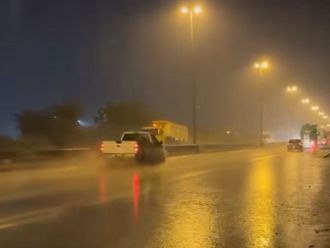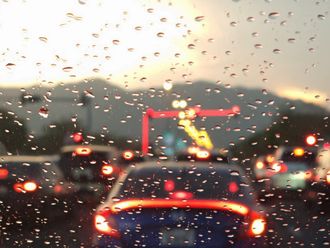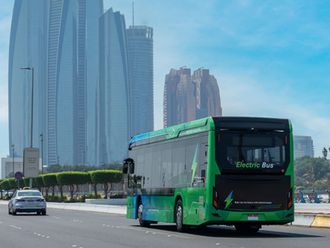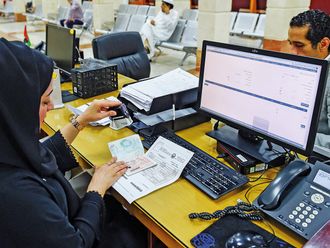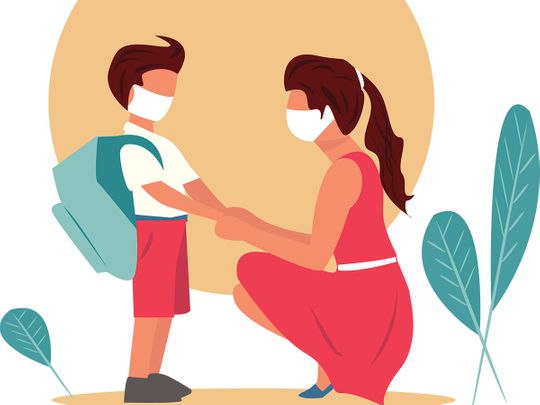
Abu Dhabi: This term’s return to school involved more than just the mandatory back-to-school shopping; there were also rounds of PCR testing, vaccination and form submission to get through for even the youngest schoolchildren. A week into the new term, however, parents have vouched for the latest COVID-19 safety measures at Abu Dhabi schools.
Speaking to Gulf News, parents said these measures are the best way to ensure a return to normalcy for children, with recent announcements that follow-up PCR testing will be carried out in school making the schoolgoing experience even smoother for all.
“My six-year-old son returned to school in person for the first time since March 2020, and I feel that we are privileged to live here in Abu Dhabi. My husband and I have both visited the school during the first week to pick up and drop him off, and we saw firsthand all the safety protocols that are being implemented,” Rumana Banu, 39, a mother-of-two from India and head of transformation, told Gulf News.
A long way
“We’ve come a long way in terms of schooling during COVID-19, and procedures at schools have helped us overcome our fears. Now, the follow-up PCR testing within school campuses will further ease the process for parents,” she added.
According to the Abu Dhabi Media Office, more than 388,000 students across Abu Dhabi have returned to classrooms in public, private and charter schools in the emirate. The increase in in-person attendance occurred despite tightened safety protocols, including mandatory PCR testing for all schoolchildren ahead of the start of classes. In addition, families say they are not fazed by the regular PCR testing requirements going forward.”
Used to PCR testing
“My children – aged four and seven - had done the PCR test earlier when travelling back from visits to Dubai, so they were not worried about having to do it just as a prerequisite to attending school. Because of the comprehensive testing arrangements for schoolchildren in Abu Dhabi, we were able to get free tests for them at a private hospital,” said Mohammad Aldaqqaq, 38, a media specialist from Jordan.
The father-of-two believes the regular PCR tests will help keep schools safe amid the pandemic.
“My daughter switched schools this term, and I visited it a week before the start of the term. I was honestly impressed with all the measures that were in place. Based on the first-week reports from my daughter, I am happy that she is able to attend school in person, especially as my four-year-old starts school tomorrow for the first time,” Aldaqqaq said.
Safe environment
Both Aldaqqaq and Banu’s children willingly underwent nasal swab PCR tests, even though Abu Dhabi facilities are offering free saliva PCR tests for children aged less than 12 years. The children will now undergo follow-up PCR testing every two weeks for the first month of schooling, in keeping with testing regulations mandated by the emirate’s education regulator, the Abu Dhabi Department of Education and Knowledge (Adek).
“In my opinion, Abu Dhabi schools are the safest environment outside their own houses for children amid the pandemic. After attending school three days a week last term because of the reopening model chosen by the school, both my daughters have this term seen a full return to school during the week,” said Samar Adnan, a mother-of two from Jordan.
Vaccines under consideration
Adnan is also considering getting her daughters vaccinated soon.
“My parents were vaccinated, and although they contracted COVID-19 in Jordan, they did not have to be hospitalised. I do believe in the efficacy of the shots, and given the ease of vaccinating children in Abu Dhabi, I am thinking of getting it done soon for my daughters,” she added.
In Abu Dhabi, schoolchildren will have to undergo a PCR test every month, beyond the first month of schooling, if they are aged less than 12 years, or if they are older but vaccinated. Only children aged at least 12 years who have not been vaccinated against COVID-19 have to take a PCR test every week after the first month of schooling.
“If there is an opportunity to forego PCR testing by getting the COVID-19 vaccine, I will consider getting my children vaccinated as well. But overall, I am very content with the way schools are welcoming children back to classrooms,” Aldaqqaq said.
Successful start
Ahd Abu Ghazal, prinicipal at Al Najah Private School, said the first week back had been ‘very successful’.
“Like last term, we have chosen a full return to school for all our students, and 99 per cent of them are back in the classroom. Parents, too, have been very cooperative. Now, based on the directives issued by Adek, we expect trained professionals to soon offer PCR testing on campus,” she said.
She added that the school had also stepped up its already rigorous hygiene measures amid the COVID-19 pandemic.
Proactive approach
At a parents webinar last week, Ayesha Al Blooshi, COVID-19 incident management team lead at the Adek, said Abu Dhabi has seen a particularly careful return to school amid the pandemic.
“For us, it’s been a balance between a return to normalcy in the school system, and keeping the kids safe. This year, we are allowing a lot more children to attend school physically, and we have found that [a] proactive approach of PCR testing really works for us. It has allowed us to keep positive cases outside of the school system, especially with new [COVID-19] variants of concern,” she said.
Key facts of school reopening
-Physical distancing requirement reduced from 1.5 metre between individuals to one metre. This helps increase school capacity from 30 per cent last term to 70 per cent
-Resumption of physical education classes, live cooking, canteen services, prayer rooms
-Bus capacity increased from 60 per cent last term to 75 per cent
-100 per cent of staff attending school physically are vaccinated against COVID-19, compared to 90 per cent last term
-84% of students aged 16 years and older are fully vaccinated against COVID-19. 52% of students aged 12-15 years are vaccination. Also, 12% of children aged less than 12 are vaccinated
-School staff and students grouped into macrobubbles of individuals who practice physical distancing and do not mingle with other microbubble. Only children up to Grade 2 can be grouped in bubbles where there is no need for physical distancing
-Children aged 16 years and more must be fully vaccinated to attend classes in school, or opt for distance learning. Arrangements also in place for those in distance learning to attend high-stakes exams in school
-Vaccine boosters required six months after completing second dose of one vaccine
-NCEMA PCR testing requirements apply to children attending school in person: 96-hour valid negative test after major holidays, testing every 14 days for the first month. Thereafter, test every month for children aged less than 12, and those who are 12 or more but vaccinated. Unvaccinated students aged at least 12 years must test every week. Saliva tests accepted for children less than 12, nasopharyngeal swab PCR for older children
-Schools to offer follow-up PCR tests on campus from September 7 onwards
-Fewer shifts to distance learning expected for students physically attending school
-Schools allowed to choose from a range of reopening models, but must provide distance learning for children physically unable to attend school due to medical reasons or incomplete vaccinations
-Live tracking of COVID-19 cases and contacts in school, and identification of COVID-19 hotspots for proactive responses, including shifts to distance learning if required
-Schools to meet health and safety criteria before being allowed to reopen, and submit daily compliance self-checks. Also routine compliance visits by Adek through the term
-Penalty system for non-compliant schools includes warnings, and fines ranging from Dh10,000 to Dh250,000
-Green Pass system applies to all parents who wish to visit schools, and PCR test must have 96-hour validity



